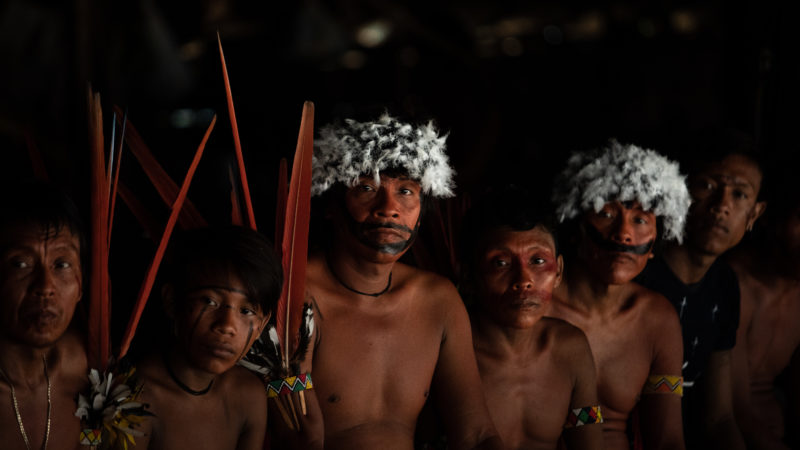Illegal mining (garimpo) has ravaged Indigenous territories, with more than 20,000 invaders in the Yanomami territory alone.
IMAGE CREDIT: Bruno Kelly / ISA
Five Yanomami Indigenous people, including two children, were injured in a shooting on July 3 in Yanomami territory, in Roraima, Brazil. The injured include a 48-year-old community leader, a 24-year-old woman, her daughter, and two girls aged 15 and 9. Searches continue for the body of the third child, which was lost in the river during the attack.
The information was confirmed by Brazil’s Ministry of Indigenous Peoples. In a statement, the Ministry reported that the injured were attended to on-site by teams dispatched by the federal government and were later transferred to health posts in Surucucu and Boa Vista. Although the circumstances and the attackers’ identities are still unknown, authorities believe they may be goldminers operating illegally in the remote and densely forested Parima region, located 200 miles from the state capital Boa Vista and 20 miles from the border with Venezuela.

During the tenure of former president Jair Bolsonaro, the Yanomami region experienced a drastic increase in mining and political negligence. In January, Amazonian news agency Sumaúma, disclosed that at least 570 Yanomami children under five years of age died from preventable diseases such as diarrhea and malaria during the years Bolsonaro held office. This represents an average of three deaths per week and a 29% increase compared to the previous four years.
In response, Brazil’s new government, led by Lula da Silva, issued a decree in January 2023, outlining a comprehensive campaign to tackle the public health emergency and expel illegal miners from Yanomami Territory.
Healthcare professionals who visited the area in January discovered that the Sesai (Indigenous Health) bases were dilapidated and critically short of medicines and food. Moreover, they found evidence of widespread malnutrition and malaria among Indigenous peoples living there, attributable to illegal gold mining in the territory.
Illegal mining on Yanomami lands escalated dramatically in 2022. According to data from Brazil’s Federal Police, mining affected 3,459 acres of the territory in 2020, which expanded to 58,564 acres in 2021, and further to 103,290 acres in 2022. This represents an alarming increase of 76% within a year and 198% since monitoring began in 2020.
Former president Bolsonaro was a vocal supporter of mining and logging, regularly using his platform to disparage Indigenous ways of life and delegitimize traditional land claims to make way for commercial exploitation.
Encompassing an area equivalent in size to Portugal, the Yanomami territory is home to over 30,400 Indigenous inhabitants and is designated as legally protected land, meaning commercial activities are prohibited. Nevertheless, the region’s rich natural resources have lured illegal gold miners for decades, devastating the forest and subjecting the Indigenous communities to recurrent cycles of violence and disease.
In 2020, Rainforest Foundation US collaborated with several NGOs to launch the “Miners Out, Covid Out” campaign, criticizing the Bolsonaro administration’s criminal negligence of the health emergency in Yanomami territory, and demanding that the government expel illegal miners from the region.








